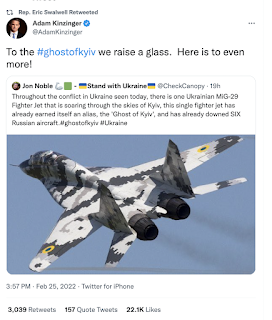"A toast...to high treason. That's what these men were committing when they signed the Declaration. Had we lost the war, they would have been hanged, beheaded, drawn and quartered, and--my personal favorite--had their entrails cut out and BURNED!"
--Benjamin Franklin Gates (National Treasure)
Glen Greenwald discusses the increased tendency to label people as 'traitors.' Out of concerns that treason term would be abused for political gain, the framers defined the limited scope of the crime in the Constitution itself. Per Article 3, Section 3:
Treason against the United States, shall consist only in levying War against them, or in adhering to their Enemies, giving them Aid and Comfort. No person shall be convicted of Treason unless on the testimony of two Witnesses to the same overt Act, or on Confession in open Court.
Treason was the only crime to be delineated in the Constitution. Why? Because the framers anticipated the grave danger of repressive governments seeking to silence criticism of, or opposition to, government policy by making it a capital crime.
Stated differently, they knew that liberal interpretations of treason would squash freedom of speech.
Given its constitutional limitations, treason has rarely been prosecuted in the United States, and less than 12 Americans have been convicted of treason in the nation's history.
Unfortunately, legal limitations have not prevented politicians and their media minions from shouting "Treason!" in the direction of those who behave in manners deemed unsupportive of consensus government policy.
Greenwald suggests that the Trump era elevated accusations of treason from a periodic transgression to a standard, reflexive way of criticizing political opposition. Indeed, the 'scandal' investigations that embroiled Trump's term can easily be seen as a protracted treason campaign. As Greenwald observes,
"The dominant narrative insisted that Trump and his allies were controlled by Moscow, subservient to the Kremlin, and were acting to promote Russian over American interests. That Trump was loyal not to the country that elected him but, instead, to an adversarial nation is something Democrats believe as an article of faith."
In reality, of course, many of those who have accused Trump of treason seem to possess little affinity for the fundamental institutions that underpin the United States and, in fact, seem hell bent on overthrowing them. As such, the Trump Treason narrative seems another ironic act of projection by this group.
In any event, thanks to the Trump Treason years, "an entire generation has been trained to believe that 'treason' is the crime of expressing views that undermine Democratic Party leaders, diverge from the US security state, and/or dispute the consensus of the US corporate press."
Enter, now, the Ukraine conflict. Russia's invasion of Ukraine three weeks ago has taken treason mania to another level. (Although Greenwald calls it 'never-before-seen,' I suspect that we have, judging from what I've gathered about the Alien and Sedition Act of 1798, as well as the Wilson and FDR years). People suggesting that NATO expansion or any other factor beyond 'Putin' helped spark this conflict, or that Ukrainian borders are not vital enough interests to the US to warrant American involvement, are reflexively labeled 'traitors.'
Our founding ancestors lived this accusation. By speaking out against the King of England they were deemed traitors for voicing legitimate political opposition to the crown. They understood that the hallmark of tyranny is intolerance of voices that questioned official government policy, and to criminalize them if possible by equating dissenting voices with treason.
That's why the framers articulated the First Amendment, and a limited criminal scope for treasonous behavior.
If you've been labeled a 'traitor' for dissenting from the party line on Ukraine, then find comfort that you're on the right side of history and of reason. Don't take the insults personally.
Better yet, pray for them.






















